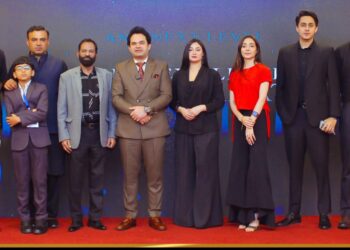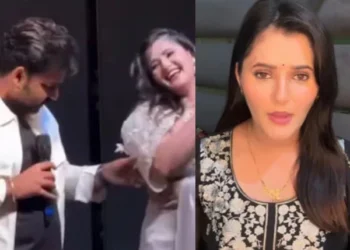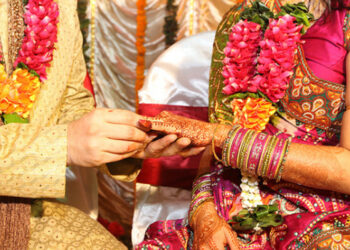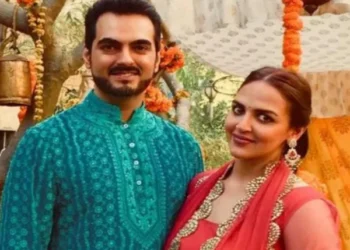Veteran Pakistani actress Savera Nadeem, known for her unmatched acting skills and graceful on-screen presence, has recently found herself at the center of an unexpected social media storm. The actress, who has long been celebrated for her natural beauty, posted a series of pictures from the set of an upcoming drama. While she looked stunning in the photos, many fans and followers were quick to point out something unusual—an apparent overuse of photo editing and AI filters.
This sparked a heated debate online, with some users expressing disappointment, others making lighthearted jokes, and many pleading for celebrities to embrace their natural looks in an era dominated by social media filters.
Savera Nadeem: A Brief Background
Savera Nadeem is no stranger to the spotlight. With a career spanning more than two decades, she has worked in countless successful dramas, films, and theater productions. Known for her powerful performances, mature personality, and grace, she has built a loyal fan base across Pakistan and beyond.
From her early days in PTV dramas to modern productions on private television channels, Savera has remained a symbol of poise and elegance in the entertainment industry. Unlike many celebrities who frequently experiment with bold fashion trends or dramatic makeovers, she has largely maintained a consistent, natural image—making her recent edited pictures all the more surprising to her audience.
The Viral Pictures
The controversy began when Savera Nadeem uploaded a set of behind-the-scenes pictures on Instagram. Dressed in an elegant, traditional outfit, the actress exuded charm and dignity. However, what caught the attention of her followers was not just her attire—it was her noticeably slimmer face, extra-bright skin tone, and overall “perfected” features.
Fans quickly speculated that the images had been heavily retouched, possibly using AI-based beauty tools and multiple filters. This perception clashed with Savera’s long-standing image as an actress who embraces authenticity, sparking waves of criticism.
Fans’ Reaction: Disappointment and Humor
The comments section under her post was flooded within hours. While some fans politely expressed their disapproval, others were more direct or even sarcastic.
- One fan wrote:
“Where did the 90s Savera go? The one who was our crush? This is some filtered version!” - Another commented:
“You are so beautiful naturally, why the need for so much editing?” - A witty user added:
“The facial editing is so much that even the passport office will not accept it!” - Others pleaded:
“We love the real Savera Nadeem, free from filters.”
The general consensus was that Savera didn’t need to rely on excessive digital enhancement, as her natural beauty and personality were already admired.
The Issue of Over-Editing in the Entertainment Industry
This incident with Savera Nadeem is not isolated. Many celebrities—both in Pakistan and globally—have faced backlash for overusing photo editing apps, AI beauty enhancers, and Instagram filters. In the pursuit of the “perfect” picture, skin tones are lightened, features are reshaped, and imperfections are erased.
While these tools can enhance an image, critics argue that they promote unrealistic beauty standards, especially when used by influential figures in the media. For fans, particularly young viewers, this can create pressure to look flawless, often leading to body image issues and low self-esteem.
Why the Backlash Was Stronger This Time
In the case of Savera Nadeem, the criticism was more intense because:
- Her Established Image – Savera has always been regarded as a natural, elegant actress who represents maturity and self-confidence. The edited photos seemed out of character.
- Generational Trust – Many of her fans have followed her career for decades, building a sense of authenticity and trust. Breaking from that image felt disappointing to them.
- Cultural Expectations – In Pakistani society, older and respected artists are often seen as role models. Fans expected her to set an example of embracing natural looks rather than conforming to unrealistic beauty trends.
Social Media and the Pressure to Look Perfect
Platforms like Instagram and TikTok have revolutionized how celebrities present themselves to the public. With millions of followers just a click away, there’s an unspoken pressure to maintain youthful, flawless appearances.
- Filters and AI tools can smooth skin, brighten complexions, and even reshape facial features in seconds.
- While this can be fun and creative, it also distorts reality, making natural aging or imperfections seem unacceptable.
- Celebrities, being in the public eye, often face harsher judgment, leading many to turn to editing as a defensive measure.
Ironically, the same tools that are meant to enhance popularity can sometimes damage public perception when overused.
Fans’ Call for Authenticity
Many of Savera’s followers used the opportunity to encourage authenticity. They argued that public figures should embrace their natural beauty, wrinkles, and signs of aging, setting a healthier standard for younger generations.
One fan’s comment summed it up well:
“We’ve loved you for years, not because you looked flawless, but because you were real. Don’t let filters hide that.”
Celebrity Responsibility in the Age of AI Filters
The discussion around Savera’s pictures opens a larger conversation about responsibility. Celebrities have significant influence over public perceptions of beauty and self-worth. When they embrace authenticity, they help normalize natural appearances. When they succumb to digital perfectionism, they may unintentionally contribute to harmful beauty pressures.
In the Pakistani entertainment industry, there has been a recent shift where some actors proudly post makeup-free, unedited photos as a statement against unrealistic standards. If Savera addresses the controversy and reaffirms her commitment to natural representation, it could send a powerful message.
Possible Reasons for the Edited Pictures
While fans speculated about vanity, there could be other explanations for the edited look:
- Photographer’s Choice – Sometimes, professional photographers automatically retouch pictures without the subject’s explicit request.
- Production Requirements – Promotional materials for dramas often undergo heavy editing for a polished, commercial look.
- Lighting and Camera Effects – Studio lighting and camera settings can exaggerate changes in facial structure and complexion, making images look different than reality.
Regardless of the reason, the backlash highlights how audiences are becoming increasingly aware of digital manipulation.
Public Figures Who Faced Similar Criticism
Savera is not alone in this. Many Pakistani celebrities, such as Mahira Khan, Ayeza Khan, and Mehwish Hayat, have at times been accused of over-editing their social media posts. Globally, even Hollywood stars like Khloé Kardashian and Madonna have faced online ridicule for heavily altered photos.
In most cases, the backlash is rooted in the same sentiment—fans want authenticity.
Conclusion
The controversy surrounding Savera Nadeem’s edited pictures is more than just a social media gossip story—it’s a reflection of a larger societal conversation about beauty, authenticity, and the influence of celebrities. While photo editing is a common practice in the entertainment industry, fans are increasingly demanding honesty and realism from their favorite stars.
For someone like Savera, whose career has been built on natural grace and talent, the expectation for authenticity is even higher. Whether this incident prompts her to address the matter or simply return to unfiltered posts, one thing is clear—her fans love her best when she’s simply herself.

























